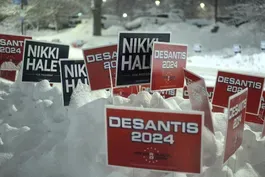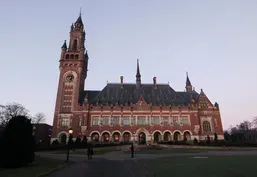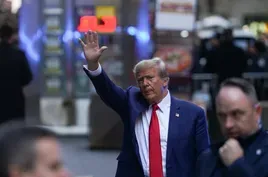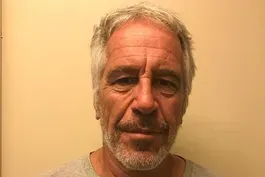
Inflation uptick complicates Fed's plan to lower rates
Clip: 1/11/2024 | 6m 34sVideo has Closed Captions
How December's inflation uptick complicates Federal Reserve's plan to lower interest rates
New data shows that inflation ran a little higher at the end of the year than expected but slowed down significantly in 2023. Consumers are still hesitant to embrace the economy's strength, a theme that was consistent throughout last year's strong economic performance. Amna Nawaz discussed the latest numbers and what might be ahead with Federal Reserve Bank of Atlanta President Raphael Bostic.
Problems with Closed Captions? Closed Captioning Feedback
Problems with Closed Captions? Closed Captioning Feedback
Major corporate funding for the PBS News Hour is provided by BDO, BNSF, Consumer Cellular, American Cruise Lines, and Raymond James. Funding for the PBS NewsHour Weekend is provided by...

Inflation uptick complicates Fed's plan to lower rates
Clip: 1/11/2024 | 6m 34sVideo has Closed Captions
New data shows that inflation ran a little higher at the end of the year than expected but slowed down significantly in 2023. Consumers are still hesitant to embrace the economy's strength, a theme that was consistent throughout last year's strong economic performance. Amna Nawaz discussed the latest numbers and what might be ahead with Federal Reserve Bank of Atlanta President Raphael Bostic.
Problems with Closed Captions? Closed Captioning Feedback
How to Watch PBS News Hour
PBS News Hour is available to stream on pbs.org and the free PBS App, available on iPhone, Apple TV, Android TV, Android smartphones, Amazon Fire TV, Amazon Fire Tablet, Roku, Samsung Smart TV, and Vizio.
Providing Support for PBS.org
Learn Moreabout PBS online sponsorshipNew data shows that inflation ra but slowed down significantly in 2023.
AMNA NAWAZ: And consumers are still# hesitant to embrace the a theme that was consistent throughout# last year's strong economic performance.
For more on how we can use these latest# numbers to understand what might be ahead,## and how consumers are viewing the economy,# I spoke earlier today with Raphael Bostic,## president of the Federal Reserve Bank of Atlanta.
Mr. Bostic, welcome to the# "NewsHour."
Thank you for joining us.
RAPHAEL BOSTIC, President, Federal Reserve Bank# of Atlanta: Thank you.
AMNA NAWAZ: So let's jus Overall, consumer prices rose a little more# than expected in December.
Core pric excluding food and energy, also rose more than# expected.
What do those numbers say to you?
RAPHAEL BOSTIC: Well, today's CPI report has# not been as positive as some of the last couple.
But seeing some volatility in inflation is not# really a surprise to me.
The economy has been## very strong and robust over the last year, and# that resilience has really been a positive thing.## It's actually been stronger than I expected.# But that resilience also means that the pace## of inflation or the speed of it coming back# down to our target is going to be slower.
And so seeing some reports every now and then# that are going in the other direction is par## for the course.
And I'm expecting that things will# be bumpier as we continue through the next year.
AMNA NAWAZ: Most of that inflation# increase that we saw was due to higher## costs for both car insurance and also for housing.
Housing costs, in particular,# accounted for more than half of## the monthly increase in consumer# prices.
We are in, as a nationwide housing shortage.
So is the only way# to bring those increases RAPHAEL BOSTIC: So, yes.
I hear exactly the same thing.
And this is# a supply issue as much as a demand issue.
So## one part of affordability is having# enough income.
But in many markets,## Atlanta being one of them, the growth in# population has outstripped the growth in units.
And that's going to put up a pressure on# prices.
And so we need to see more supply.
AMNA NAWAZ: Now, the Fed has signaled that they're## done raising rates.
Do you be RAPHAEL BOSTIC: Well, soon -- soon means# different things to different people.
Look, my expectation is that inflation is going# to decli which means that we won't be in a position to# cut rates for quite some time.
My outlook has## us showing rates starting to fall in# the third quarter of this year.
But,## again, we will have to see how inflation# progresses in the next several months.
AMNA NAWAZ: Well, three days ago in a# speech, you did say that, as you mentioned,## inflation has come down.
You have mentioned you're# on t When do you expect that target to be# reached?
Is there any way to predict that,## given, as you said, it's not a linear path?
RAPHAEL BOSTIC: Well, we have models,# and My outside model on this says that we should get# to 2 percent in our measure bu t a lot's going to happen between now# and then.
So I don't put too much stock## in any of those longer-term issues.
And# I just try to keep an eye on where things are going month to month and try to just have# a clear understanding about where we stand.
If the economy comes in stronger and inflation# goes faster to our target, then I will be willing## to pull forward, perhaps, my willingness to cut.# But we will just have to see how things play out.
AMNA NAWAZ: I hear your note of caution.
I'm# curious if you can tell us more about where## you see that potential volatility.
Is it# domestically, turmoil around Is it globally with more instability# and two wars?
Where are you looking?
RAPHAEL BOSTIC: I'm looking# everywhere, to be honest.
You called out two things.
The# geopolit are a big problem.
We have seen just# in the last several days the cost of## shipping go up by a considerable amount# because of turbulence in the Middle East.
In the Southeast, we have seen storms that# have created historic levels of damage and## disrupted economies in significant ways.# And there's still uncertainty about the## progression of the virus.
As you know, we're# seeing more people get sick and tragically die.
And so all of those things will come into# play.
And depending on how they play out,## that will have a real implication# for the trajectory of the economy.
AMNA NAWAZ: Mr. Bostic, can I get your# take on this so-called vibe th is idea that consumer confidence# -- and we have seen this over the## last year -- has really lagged behind the# actual strength and recovery When you look at that, how# do you explain that gap?
RAPHAEL BOSTIC: Well, for me, I think it really is# th at prices are much higher than they were two# years ago.
And their wages did not go up as much.
And so that realization, that recognition is# really present in people's minds.
We all go to## the grocery store on a regular basis.
Gas was# much higher.
It's come down.
So that's not a## pressure point nearly as much.
As we start to# see more and more of goods get back to pricing## that is close to where it was before, or if# our incomes go up more strongly, I think that## that kind of negativity will likely dissipate,# and we will start to see the numbers evolve.
But human psychology is not# something that turns on a dime,## and it would really take time and# experience lived for those things to shift.
AMNA NAWAZ: And we did see, I should mention,# consumer confidence go up slightly in December.## But, overall, there's been concern that it# could become, that pessimism could become## sort of a self-fulfilling prophecy and# could potentially lead to a recession.
Do you still believe there could be a recession?
RAPHAEL BOSTIC: Well, there's always a probability# We spend a lot of time tracking people's# expectations about where the economy## is likely to go.
And I have been really# pleased to see that the American people,## by and large, have confidence that# inflation is going to get back to## 2 percent and that the economy will be able# to stand on its own and As long as we start to continue -- as long# as we continue to see signs like that,## I have every confidence that the economy will# be fine, growth will happen, businesses will## continue to hire and produce, and the quality of# life in this country will continue to improve.
AMNA NAWAZ: All right, that is the president of## the Federal Reserve Bank of Mr. Bostic, thank you so much# for your time.
Appreciate it.
RAPHAEL BOSTIC: Thank you so much for inviting me.
A Brief But Spectacular take on dance as activism
Video has Closed Captions
A Brief But Spectacular take on dance as activism (2m 49s)
Experts give views on genocide accusations against Israel
Video has Closed Captions
Experts give 2 perspectives on accusations Israel is committing genocide in Gaza (12m 43s)
GOP contenders sprint across Iowa with 4 days until caucuses
Video has Closed Captions
GOP contenders make closing arguments in Iowa with 4 days until caucuses (7m 57s)
South Africa accuses Israel of genocide at top UN court
Video has Closed Captions
South Africa accuses Israel of genocide against Palestinians at top international court (4m 39s)
U.S., U.K. strike Houthis in Yemen for Red Sea attacks
Video has Closed Captions
U.S. and U.K. strike Houthi targets in Yemen for attacks on ships in Red Sea (3m 30s)
What happened during closing arguments in Trump fraud trial
Video has Closed Captions
What happened in the courtroom during closing arguments in Trump's civil fraud trial (4m 37s)
What the Epstein documents reveal about his sex trafficking
Video has Closed Captions
What the newly released Jeffrey Epstein documents reveal about his sex-trafficking ring (4m 30s)
Providing Support for PBS.org
Learn Moreabout PBS online sponsorshipSupport for PBS provided by:
Major corporate funding for the PBS News Hour is provided by BDO, BNSF, Consumer Cellular, American Cruise Lines, and Raymond James. Funding for the PBS NewsHour Weekend is provided by...


















